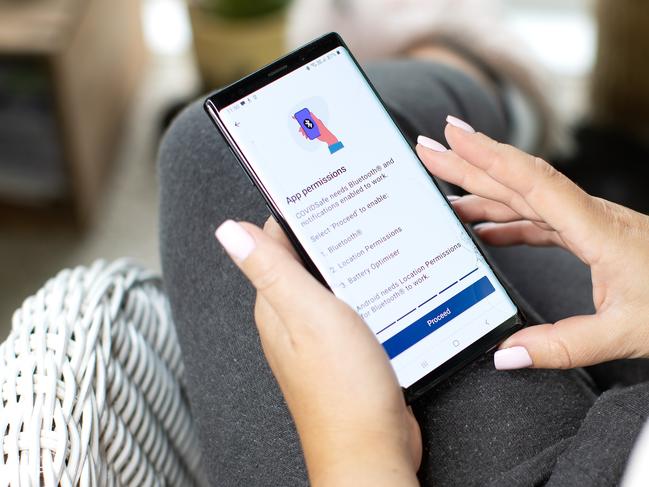Aussies split on whether to download the government’s CovidSafe app
There are three types of Aussies: those who will download the CovidSafe app, those who won’t, and those who remain to be convinced. What should the government do to reach those people?

Coronavirus
Don't miss out on the headlines from Coronavirus. Followed categories will be added to My News.
Two thirds of Australians say they will either download the federal government’s CovidSafe app, or will consider doing so if they receive more information about it.
An online survey of 940 Australians conducted by the personal finance app Humaniti over the weekend found that 23 per cent of respondents said they would definitely download the app, while a further 43 per cent replied ‘maybe’.
But in a potentially worrying sign for the government, slightly more than one in three respondents (34 per cent) said they would not register for the Bluetooth-enabled contact app.
The government has previously said it needs 40 per cent of Australians to register for the app to be an effective tool in the fight against coronavirus.
One million people had downloaded CovidSafe within the first five hours of it becoming available on Sunday night.
An online survey conducted by Bastion Consulting produced even more worrying data.
Just thirty-nine per cent of respondents to their survey said they were likely to download the app, while 40 per cent said they were not likely to do so, and 20 per cent said they were neutral. Females were more likely to download the app than males.
Marketing expert Dee Madigan said the relatively high number of people who were already saying they definitely would not download was a matter of concern.
“With any campaign you identify the low hanging fruit if you like, the (people) you can get, and they’d be the ones in the unsure basket. How you get the noes is trickier,” she said.
“It’s very hard to change people’s minds. When people are deciding, you can kind of get to them – but when they’ve said they won’t, that’s really hard. What happens then is that all the information you put out, they read in terms of defending their position.”

Of the people who told Bastion Consulting they were not likely to get the app, trust in the government was a key issue. Seventy-one per cent of those respondents said they did not trust the government not to use the data for other purposes.
Ms Madigan said some people might need a further incentive to download the app.
“We put apps on our phone all the time for the dumbest reasons. We’ve literally given our information to Russia just so we can see what our face will look like when we’re older, so a little bit more personal incentive might be a good idea. But again you have to be careful; people don’t like to feel they’re being blackmailed, even in a good way.”
Melbourne University marketing lecturer Dr Brent Coker said incentives could either be financial, such as a grocery or telco bill discount, or informational.
“If there was a screen built into this app so somebody could see where new cases had been identified and where the risky parts of town are; that's a personal benefit,” he said. “And that information is not super transparent at the moment.”
“People do care about the wellbeing of the nation and their city and so on but not as much as their personal wellbeing, and so if you’ve got an app you want people to download, you really need to build something in there that’s going to benefit the individual.”

The age cohort with the biggest resistance to downloading the app in the Humaniti study was people aged between 25 and 29. Fifty per cent of respondents in that age bracket said they would not download the app.
“You can’t blame them; this is a government with a really poor history of managing information online,” Ms Madigan said, citing the Centrelink Robodebt scandal and the census fail of 2016 as two examples.
“Also, young people don’t like being told what to do, as anyone who’s got children knows,” she said.
